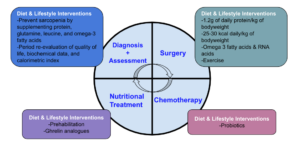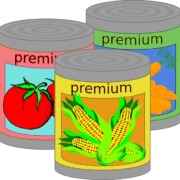Enhancing Colorectal Cancer Prevention with Diet: Molecular Pathways and Improved Outcomes
Nutrition & Colorectal Cancer Prevention Series: Blog 1
The link between nutrition and colorectal cancer (CRC) prevention is well established. Researchers have found that low-inflammation diets, such as Mediterranean diets, are associated with lower risk of CRC. This study also affirmed the link between sugar intake and CRC risk, with individuals who consume beverages high in sugar being more likely to develop rectal adenomas.
Other studies have explored the links between highly processed foods and development of colorectal adenomas. In addition to highly processed foods, canned foods have also been shown to increase risk of colorectal polyps when measured against fresh fruits and vegetables.
These associations provide evidence that a low-inflammation diet that is low in sugar and processed foods can lower the risk of developing CRC; however, there is limited research on the impact of nutritional interventions on those who are already diagnosed.
Can Dietary Interventions Improve CRC Outcomes?
A study published earlier this year explored the answers to that very question.
In accordance with previous research, the authors found that the Mediterranean diet was effective in reducing CRC tumor growth. The mechanisms that are responsible for this inhibited tumor cell growth include the presence of beta-carotene, which is found in a number of fruits, vegetables, and fish. When beta-carotene interacts with fibroblast activation markers, the fibroblasts repress tumor cell growth in the colon.
Additionally, anti-inflammatory diets can suppress the growth of CRC tumors via immune system pathways. Tea polyphenols, most commonly found in green tea, add diversity to the gut microbiota by often raising short-chain amino acid levels, which in turn promotes the growth of anti-inflammatory gut bacteria. Elevated levels of these “good bacteria” help to modulate the environment within which CRC develops, and aid the immune system in preventing tumor cell growth and spread.
While it is important to understand these pathways, successful, consistent implementation of preventative diets is the key to unlocking the benefits that come from the pathways. The chart below, adapted from this study, provides a framework for workable diet and lifestyle interventions during the various stages of colorectal cancer treatment, from diagnosis to surgery. Key elements of these interventions involve exercise, protein intake, and supplementation of key nutrients such as omega-3 fatty acids.

Blog 2 in this series can be found here: Tackling Fresh Food Inequality.
Emma Edwards is a Colorectal Cancer Prevention Intern with the Colon Cancer Foundation.





Leave a Reply
Want to join the discussion?Feel free to contribute!